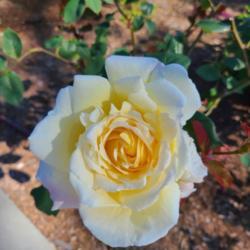Scentwise ( something that I really search for deliberately), I found that it depends how the bushes are placed within a room like enclosed garden. Since fragrance is generated by droplets of essencial oils that are kept suspended in a colloidal form in the atmosphere, it is important to reduce air flow as much as possible. ( the contrary of what is said for growing roses).So I plant my very fragrant roses right next to the house entrance in a very protected place. Let them grow high so that reach and bloom at my standing up nose level. Then yes, although the fragrance couldn't be sensed as a waft, the odour is noticeable and strong enough to become a pleasant reminder of their existence. I'm more than happy with that much, outside. A few, I cut and bring them inside and then I enjoy their fragrance in a vase.
I checked the Köppen climate link and really I still have difficulties of finding where my place fits. Yes it belongs most of the days of the year to Cbf or Cbc. However every now and then, it changes to something else when the prevailing winds shift towards the eastern Atlantic. In summer if that happens, we can get a few days of humid tropical warm weather, then the westerlies take over and return to the oceanic climate. That same pattern in winter may bring a heavy snowstorm and grief provoking freezes...

Fortunately these oscillations last for a short time.
I still believe that those that live in much wetter climates than mine , but still have cool overall summers like mine, should concentrate their choice of garden roses that originate from European countries that have similar climate pattern. Thus the DAs are so well suited. Of course DAs from the US nursery is a different matter. They have to supply for a vast majority that live in a much hotter climate. Although the assumption that DA's do well everywhere is more related to wishful thinking of DAltd., than a fact, original DA's are best adapted to their origins, that is the oceanic climate. I'm only now getting to understand their needs and also avoid commonplace generalized growing strategies. Each one of my DA is slightly different. Some may be quite different. Each needs to find the right position. Most are very happy growing with less than 4 hours of direct sunlight. Afternoon high shade is something that almost all my DA's love. I have quite a few still inside pots because I keep moving them around trying to detect inside my yard where each one likes best. All my roses grow much slower than those experienced by northern growers. Yet all reach the same final size. So its simply that: slower.
A few of my bushes that were bred for warmer sunny climates, need a hot place in my beds for them to strive: i.e.'Anvil Sparks' or 'Double Delight'. That again can be found once one understands what the bush is asking for. Then sure enough, where I would find it too hot and bright to sit for a while in mid-summer, is where that rosebush ought to be placed.
As I'm looking forward already for next growing season, I do have a few spots that meet with that requirement here. Not too many, but large enough to host 8 - 10 bushes of that sort.
Most ARS award contender roses would not do well here.On the contrary most OGRs or English, French or German roses grow well here. I also find it interesting comments around a newly establishing bush in relation to a fully grown one. Here my incomers that arrive bare root mid winter
have to spend dormant the first winter inside my cool greenhouse. Otherwise they don't make it through. They are just too unsettled to put up new growth ( above and below ground) to be able to handle cool/cold springs with frequent freeze/thaw episodes, so as to start building up body mass. This of course I learnt it the hard way....

Arturo

